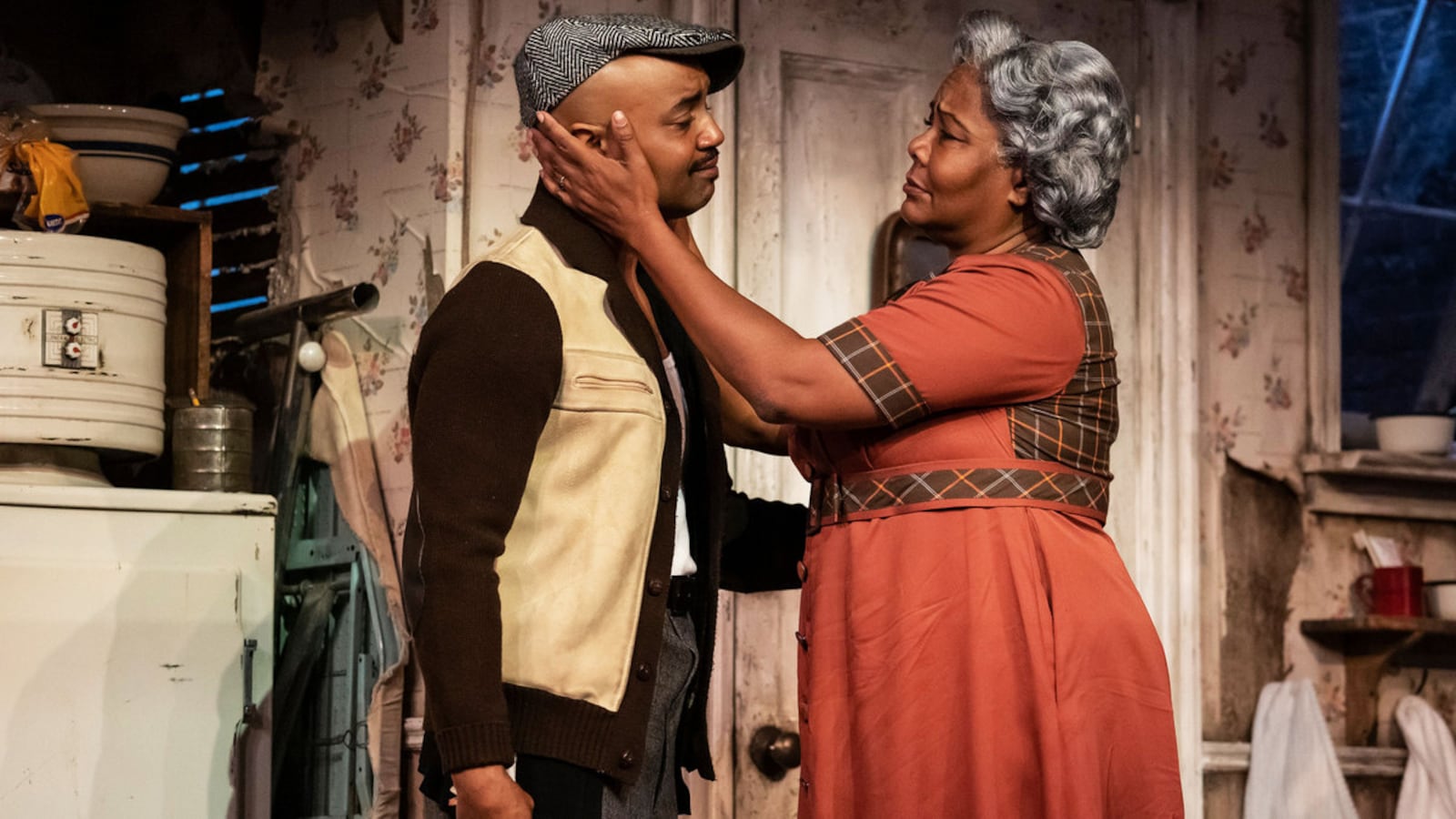Nineteen-fifty-nine, the year that Lorraine Hansberry’s A Raisin in the Sun was first performed on Broadway, may seem an extremely long time ago. But in one of the best productions so far in this season of New York theater—all of 63 years later—a pristine new production of Hansberry’s classic play about family, racism, identity, and social mobility opens at the Public Theater tonight (to Nov. 20), directed by Robert O’Hara. How fresh it feels, painfully so. To be blunt: This is a must-see, a buy-a-ticket-right-now.
Hansberry was 29 when the play was first performed and died, far too young, at 34. A Raisin in the Sun has been seen much on stage and screen, but whether you have seen it or not, the Public’s revival is as vital as it is accomplished.
Clint Ramos’ perfect design—the living room of the Younger home on Chicago’s Southside—is the first thing that hooks you. It is as just as Hansberry herself described: “Weariness has, in fact, won in this room. Everything has been polished, washed, sat on, used, scrubbed too often. All pretenses but living itself have long since vanished from the very atmosphere of this room.” It is a genuinely lived-in space; a home with a beating heart, but also a place that has seen better days. Its scuffs and tears are lived with, but not charming for those who have left to live with them.
The play—witty, acutely observed, moving, beautifully played and paced—is set in the early ’50s, and the hubbub of Younger family life tugs the audience toward the play’s larger themes. As the play opens, Ruth (Mandi Masden) is trying to marshal just another morning of disorganized chaos, with husband Walter Lee (Francois Battiste), young son Travis (Toussaint Battiste, Francois’ son—adorably scene-stealing), and sister-in-law Beneatha (Paige Gilbert), a student hoping to be a doctor, and at a multiplicity of crossroads—of professional ambition, gender equality, personal realization, and romantic possibility.
In a luminous performance, Tonya Pinkins plays matriarch Lena Younger—kind, strong, and also ruling the house with a rod of iron. Her husband Bobo’s ghost (Bjorn DuPaty) haunts the home with a cautionary benevolence. At its heart, A Raisin in the Sun is about change—its possibilities and its impossibilities—focusing on what the family will do when Lena uses a lump sum of money she has to buy a property in a white neighborhood, Clybourne Park, ignoring Ruth’s counsel: “Just pack up and leave! Go on away and enjoy yourself some. Forget about the family and have yourself a ball for once in your life.”

(l to r) Mandi Masden, Tonya Pinkins, and Toussaint Battiste in The Public Theater revival of 'A Raisin in the Sun.'
Joan MarcusA representative of the new neighborhood association, Karl Lindner (Jesse Pennington) visits them to make clear the family will not be welcome to move in, and wants to pay them off to stop them from doing so. So, will they accept the racist payoff?
The play takes its title from Langston Hughes’ poem “Harlem”: "What happens to a dream deferred? / Does it dry up / Like a raisin in the sun? / Or fester like a sore—And then run? / Does it stink like rotten meat? Or crust and sugar over—Like a syrupy sweet? / Maybe it just sags/Like a heavy load./Or does it explode?”
There are many dreams deferred in A Raisin in the Sun—and a lot of things festering. Ruth wants a different family life than the one she has in this worn-out room. Walter has unfulfilled professional dreams. Beneatha’s story encompasses the most cross-currents—desiring to connect with her African roots through one suitor, Joseph Asagai (John Clay III), while another suitor, George Murchison (Mister Fitzgerald), comes from a rich family, and demeans Walter. As Beneatha says, “The Murchisons are honest-to-God-real-live-rich colored people, and the only people in the world who are more snobbish than rich white people are rich colored people. I thought everybody knew that.”
And there is Lena, who has the means to transform the family’s circumstances. But can they surmount the racism and obstacles represented by Lindner? Hansberry doesn’t leave the payoff as a basic question either—she posits two options for how those obstacles could be resolved; one would represent Walter’s diminishment, but the money would still be theirs.

John Clay III, left, and Paige Gilbert in the Public Theater revival of 'A Raisin in the Sun.'
Joan MarcusProperty, mobility, ownership—a space not just of their own, but a space that insists on equality with white people—this is the possibility that the Younger family has within its grasp, and we feel their happiness at the imminent escape. Ruth cannot wait to leave “these Goddamned cracking walls!” and “these marching roaches—and that cramped little closet which ain't now or never was no kitchen! ... then I say it good and loud, HALLELUYAH! AND GOODBYE, MISERY... I DON'T NEVER WANT TO SEE YOUR UGLY FACE AGAIN!”
Watching the play reminded this critic of the echoing presence of Shelagh Delaney’s landmark A Taste of Honey, a similarly revolutionary play that was first performed at the Theatre Royal, Stratford East, in 1958, then its first West End production followed in 1959—the same year as Raisin premiered on Broadway. Its classic film adaptation, starring Rita Tushingham and Murray Melvin, was also released in 1961.
Both Hansberry and Delaney were young female playwrights, writing about race, gender, and sexuality at a time when the theater was almost entirely dominated by white, male creators. Both plays are not gentle plays, they’re detonations of old orders. They don’t take the audience gently by the hand; they expect the audience to enter and come to know these worlds as intimately and originally as they are drawn.
Beneatha is Raisin’s most radical and fascinating character, questioning every structure and expectation around her, “I’m just tired of hearing about God all the time. What has He got to do with anything? Does he pay tuition?” she asks. After Lena slaps her, she says, “I also see that everybody thinks it’s alright for Mama to be a tyrant. But all the tyranny in the world will never put a God in the heavens!”
Walter imagines his own future “stretched out in front of me—just plain as day… a big, looming blank space-full of nothing. Just waiting for me.” He walks all over town, looking at other Black men, imagining pasts, presents, and futures. His mother wants him to act as the head of the family, to be the proper, living inheritor of Bobo’s spirit.
As the family confronts Lindner’s offer, they also come to confront how far they, and other Black people, have and have not traveled, and what accepting the offer would mean.
As Walter mulls what to do about Lindner’s offer, Lena says, “I come from five generations of people who was slaves and sharecroppers—but ain’t nobody in my family never let nobody pay ’em no money that was a way of telling us we wasn’t fit to walk the earth. We ain’t never been that poor. We ain’t never been that—dead inside.”
Beneatha replies, “Well—we are dead now. All that talk about dreams and sunlight that goes on in this house. It's all dead now.”
“What’s the matter with you all!” Walter says. “I didn’t make this world! It was give to me this way! Hell yes, I want me some yachts some day! Yes, I want to hang some real pearls ’round my wife’s neck! Ain’t she supposed to wear no pearls?”
At the end of the play, we are left, as 1959’s audiences were, with many questions. What does true equality mean? What is its literal price? When, indeed will, prejudice ever end? What place, what space, can marginalized groups safely live in? O’Hara and this brilliant company of actors and creators have one final thudding surprise. It gives Hansberry’s words a sharply contemporary boomerang from past to present. And what we see before us—showing how far society has not evolved, how far it has to go—hits terribly, shatteringly hard.







